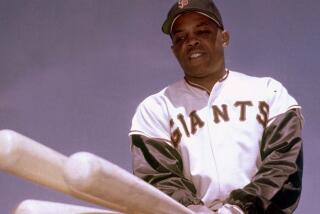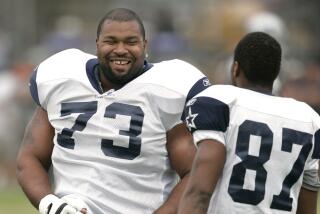Bob Hayes, 59; Olympic Gold Medalist Turned Football Star
- Share via
Bob Hayes, the Olympic gold medal sprinter and Dallas Cowboy receiver whose scorching speed prompted NFL coaches to design new defenses to stop him, has died. He was 59.
Hayes died late Wednesday at Shands Hospital in Jacksonville, Fla., his hometown, where he had been battling liver ailments and prostate cancer.
Cowboys owner Jerry Jones, who last season made Hayes the 11th member of the team’s Ring of Honor, released a statement Thursday in which he called Hayes “an American sports hero” with “once-in-a-lifetime athletic talent.”
At the 1964 Olympics in Tokyo, Hayes won the gold medal in the 100 meters, tying what was then the world record of 10.05 seconds, and he anchored the U.S. 400-meter relay team, which won in a world-record 39.06. His victory in the 100 meters earned him the unofficial title “World’s Fastest Human.”
The Cowboys made the Florida A&M; track star a seventh-round pick that year, hoping his astounding speed would make up for his unpolished football skills. It did. In an 11-year career with the Cowboys and the San Francisco 49ers, he caught 71 touchdown passes, made three trips to the Pro Bowl and became the only athlete to win an Olympic gold and a Super Bowl ring. The “World’s Fastest Human” was “Bullet Bob Hayes” to NFL fans.
Hayes’ 20-yard career reception average is among the top five for NFL receivers with a minimum of 200 catches.
In the 1970 season, when he helped the Cowboys to their first Super Bowl appearance, he scored 10 touchdowns and averaged a career high average of 26.1 yards a catch.
But his most gratifying season might have been his rookie year, when he made the Pro Bowl and proved he could make the transition from track star to football hero.
“I got more exposure in my rookie year with the Cowboys than a Heisman Trophy winner would have gotten,” Hayes told the Florida Times-Union in 1999. “There was a negative aspect to me being there. A lot of people didn’t think a world-class sprinter of my stature would make the team, never mind revolutionize the passing game of pro football.”
Opposing teams found him too fast for traditional man-to-man coverages, so they had to come up with zone defenses--in which players were assigned to safeguard certain sectors of the field--to keep pace with him.
Hayes’ coach at Dallas, Tom Landry, was able to incorporate running backs into the passing game because Hayes had defenses so preoccupied.
“His speed was mind-boggling,” former Dallas defensive back Charlie Waters said. “When he got even with you, you’d already lost the race.
“Most of the track guys I ever knew were kind of lean. When I met Bob, the first thing I noticed was he had such a developed chest and upper-body strength. Almost a barrel chest for a small man. He used that piston action, with the pumping of his arms, to drive his legs. I’d never seen that.”
Quarterback Roger Staubach once said of Hayes: “When he hit full stride, there was a definite fear factor.”
Yet Hayes was never enshrined in the Pro Football Hall of Fame, largely because of drug and alcohol problems that tainted his legacy, and eventually landed him in a Florida prison. He served 10 months behind bars in 1979 after pleading guilty to delivering narcotics to an undercover police officer. It was a transgression that “destroyed my life,” Hayes said in his autobiography, “Run, Bullet, Run: The Rise, Fall, and Recovery of Bob Hayes.” That he never made the Hall of Fame was a monumental disappointment to him, friends say.
“There’s no question he really wanted that Hall of Fame recognition,” fellow Cowboys receiver Drew Pearson said. “He really wanted to make that walk, wear that gold jacket. He really wanted that before he passed on.”
Teammates remember Hayes for his spirited sense of humor as well as his incredible athletic skills. He was the class clown, “one of the most delightful, lighthearted, fun-loving guys I’ve ever known,” Waters said.
Among Hayes’ favorite victims were tight end Pettis Norman and fullback Robert Newhouse.
Norman was terrified of crickets and grasshoppers, so Hayes routinely slipped them down the back of his jersey. Newhouse wore shoes with a width of 7E, almost as wide as they were long.
“Bob used to call him ‘Elephant feet,’ ” Pearson said. “He’d say, ‘They’re not only wide, but they’re crusty too.’ ”
In August, Pearson got an unexpected phone call from Hayes, who just wanted to chat. The Cowboys had just played an exhibition game at Jacksonville, and the teams had asked Hayes to perform the honorary pregame coin toss. He was proud to do so.
“We all knew he was sick and his days were numbered,” Pearson said. “But you couldn’t tell that by talking to him. He was trying to make everyone else around him feel comfortable, make them feel at ease. In his mind, he always thought he could overcome this.”
A strong case can be made that Hayes belongs in the Hall of Fame. He ranks higher in career catches and receiving yards than Lynn Swann, who was inducted last year, and averaged a remarkable 20 yards a catch. On average, Hayes scored a touchdown every 5.23 times he caught the ball, more frequently than Hall of Fame receivers Lance Allworth (6.38), Raymond Berry (9.28) and Charley Taylor (8.22).
Because he was not inducted within a 15-year window on the regular ballot, Hayes’ only chance to reach Canton, Ohio, rests with the nine-member seniors committee, which presents one inductee a year. Perhaps because he felt so snubbed, Hayes felt particular satisfaction in being included in the Cowboy Ring of Honor.
“I’m thrilled, I’m grateful, I’m blessed,” Hayes told the Texas Stadium crowd when he was inducted. “I played for the world’s greatest professional sports team in history. Once a Dallas Cowboy, always a Dallas Cowboy.”
Hayes is survived by five children, his mother, a brother and a sister.
More to Read
Go beyond the scoreboard
Get the latest on L.A.'s teams in the daily Sports Report newsletter.
You may occasionally receive promotional content from the Los Angeles Times.











